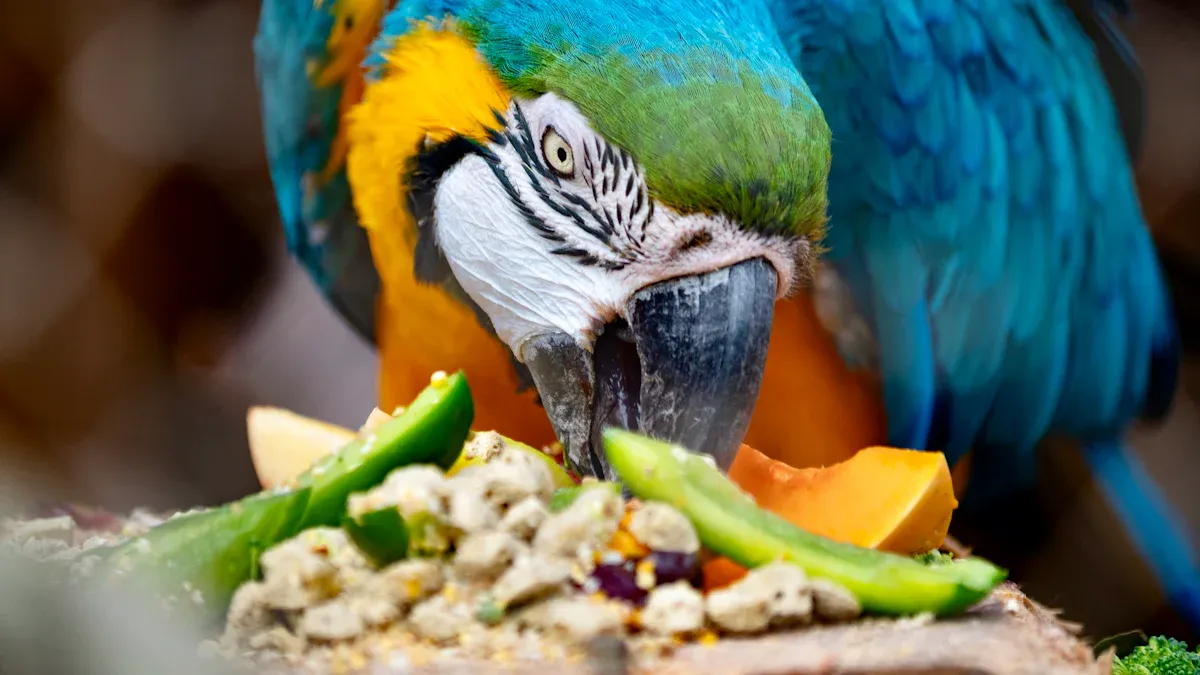
Mealworms for parrots give birds a tasty way to get complete protein and essential nutrients. Parrots feel more energetic and healthy when they eat these treats. Many owners notice their birds show natural behaviors and seem happier. These small snacks support a lively, active lifestyle for parrots.
Key Takeaways
- Mealworms provide parrots with complete protein, healthy fats, and important minerals that support strong muscles, shiny feathers, and good health.
- Feeding mealworms encourages natural foraging behavior, keeps parrots active, and helps during breeding and molting seasons.
- Use mealworms as a treat in small amounts, choose dried mealworms for easy storage, and always balance them with other foods for a healthy diet.
Nutritional and Practical Benefits of Mealworms for Parrots
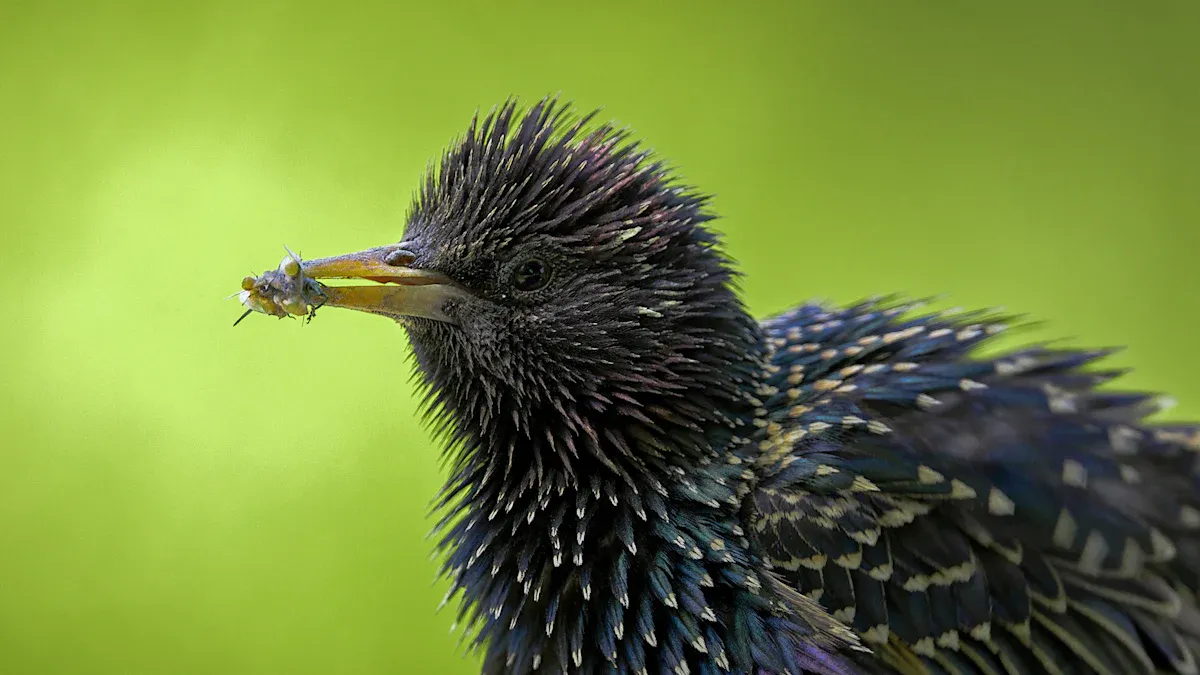
Complete Protein and Essential Amino Acids
Mealworms for parrots offer a powerful source of protein. Parrots need protein to build strong muscles, repair tissues, and stay active. Many natural foods like seeds and fruits do not provide all the essential amino acids that parrots require. Scientific studies on birds show that mealworms contain high levels of every essential amino acid. Seeds might have enough lysine and arginine, but they often lack methionine. Fruits usually fall short in most amino acids. When birds eat mealworms, they get a complete set of amino acids, which helps them grow and stay healthy. This makes mealworms a smart choice for parrots who need a balanced diet.
Healthy Fats, Vitamins, and Minerals
Mealworms for parrots also deliver healthy fats, important vitamins, and a wide range of minerals. These nutrients help parrots keep their feathers shiny, support their immune system, and give them energy for play and flight. The fat content in mealworms can vary, but it often ranges from about 18% to almost 49% of dry matter. Mealworms contain good fats like oleic acid and linoleic acid, which are important for heart and brain health.
Here’s a quick look at the nutrients found in mealworms:
| Nutrient Type | Details & Benefits |
|---|---|
| Healthy Fats | Crude fat: 18.6%–48.6% dry matter; includes omega-3 and omega-6 fatty acids |
| Minerals | Rich in phosphorus, magnesium, potassium, zinc, and manganese |
| Vitamins | Contains some vitamins, but more research is needed for exact amounts |
The mineral content in mealworms stands out. Studies show that mealworms have high levels of phosphorus, magnesium, potassium, zinc, and manganese. These minerals help parrots build strong bones, support nerve function, and keep their bodies working well. The exact vitamin content is still being studied, but mealworms do provide some vitamins that help parrots stay healthy.
Easy Digestion and Convenient Storage
Parrots can digest mealworms easily. Their bodies break down the protein and fats quickly, so they get energy fast. Many owners choose dried mealworms because they are simple to store and last a long time. Innosentia Dried Mealworms are 100% natural and packed with protein, vitamins, and high-grade edible oils. These treats give parrots a high-energy snack that fits right into their daily routine. Dried mealworms also work well for anyone who feels squeamish about handling live insects. They stay fresh for months, making them a practical choice for busy pet owners.
Tip: Store dried mealworms in a cool, dry place to keep them fresh and tasty for your parrot.
Behavioral and Health Advantages of Mealworms for Parrots
Promotes Natural Foraging and Enrichment
Parrots love to search for food. Mealworms for parrots help them use their natural foraging skills. Owners can hide mealworms in toys or scatter them in the cage. Parrots will dig, peck, and explore to find these tasty treats. This activity keeps their minds sharp and helps prevent boredom. Many birds feel happier when they have a challenge during mealtime.
Tip: Try placing dried mealworms inside a foraging ball or under some shredded paper. Watch your parrot enjoy the hunt!
Supports Breeding, Molting, and Feather Health
Parrots need extra nutrients during breeding and molting. Mealworms give them a boost of protein and healthy fats. These nutrients help birds grow new feathers and support egg production. Many breeders use mealworms to help their birds stay strong and healthy during these times. Shiny feathers and good energy often follow a diet with mealworms.
| Benefit | How Mealworms Help |
|---|---|
| Breeding | Supports egg production |
| Molting | Aids feather regrowth |
| Feather Health | Promotes shine and strength |
Prevents Dietary Boredom and Encourages Activity
Parrots can get bored with the same food every day. Mealworms add variety and excitement to their meals. Birds become more active when they see a new treat. They may flap, hop, or call out with excitement. This extra movement is good for their bodies and minds.
Note: Switching up treats like mealworms keeps parrots interested in eating and playing.
How to Safely Add Mealworms for Parrots
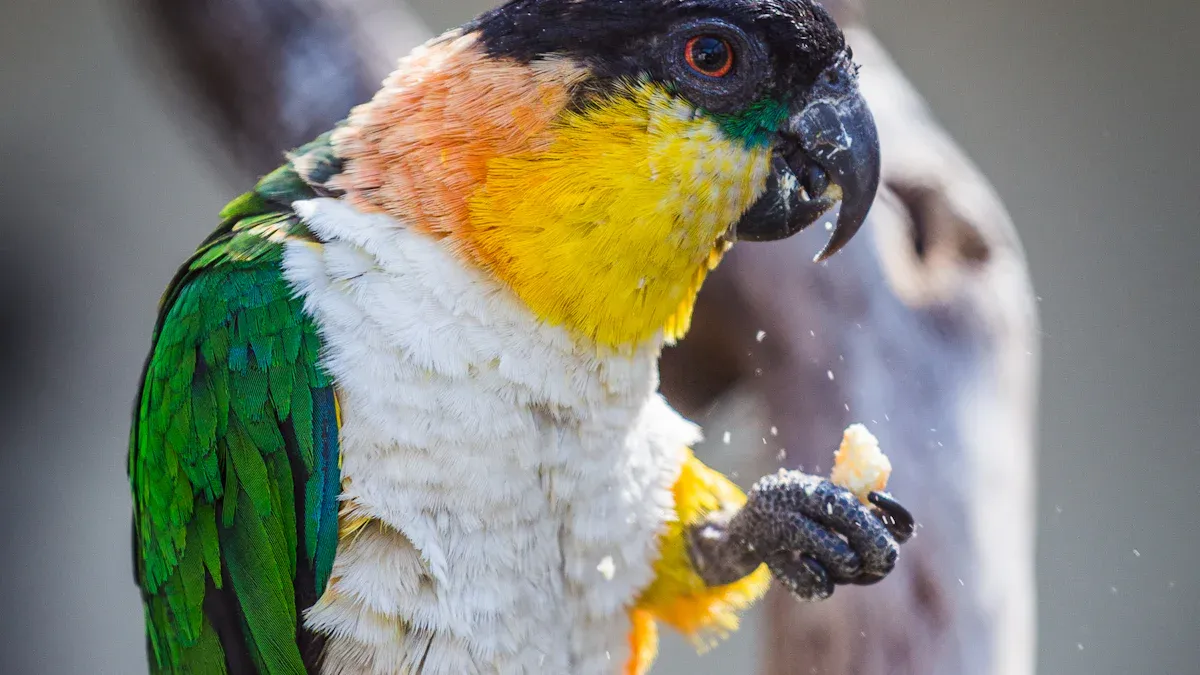
Serving Suggestions and Portion Control
Parrots enjoy mealworms as a treat, but portion control matters. Avian nutrition experts recommend using mealworms as a supplement, not the main meal. Owners can sprinkle a small handful over fresh fruits or mix them into pellets. For most parrots, a few mealworms two or three times a week works well. The table below shows how different poultry types benefit from various mealworm inclusion rates:
| Poultry Type | Mealworm Inclusion Rate | Observed Benefits |
|---|---|---|
| Broilers | 75% and 100% | No significant difference in performance traits |
| Cobb broiler | 5%, 7.5%, and 10% | Improved performance and meat quality traits |
| Ross 308 broiler | 20% | Improved meat quality traits |
| Ross 708 broiler | 5% | Improved performance and cecal microflora |
| Hy-line brown laying hens | 3% | Improved performance and blood biochemistry traits |
| White Leghorn laying hens | 5% and 7.5% | Improved performance and egg quality traits |
Mealworms for parrots should make up only a small part of the diet. Too many can lead to an unbalanced meal plan.
Choosing Between Live and Dried Mealworms
Both live and dried mealworms offer nutrition, but they have differences. Live mealworms contain more moisture and are easier for baby birds to digest. Dried mealworms, like Innosentia Dried Mealworms, have higher protein and fat content. They also store well and are easy to handle. The chart below compares their nutrition:
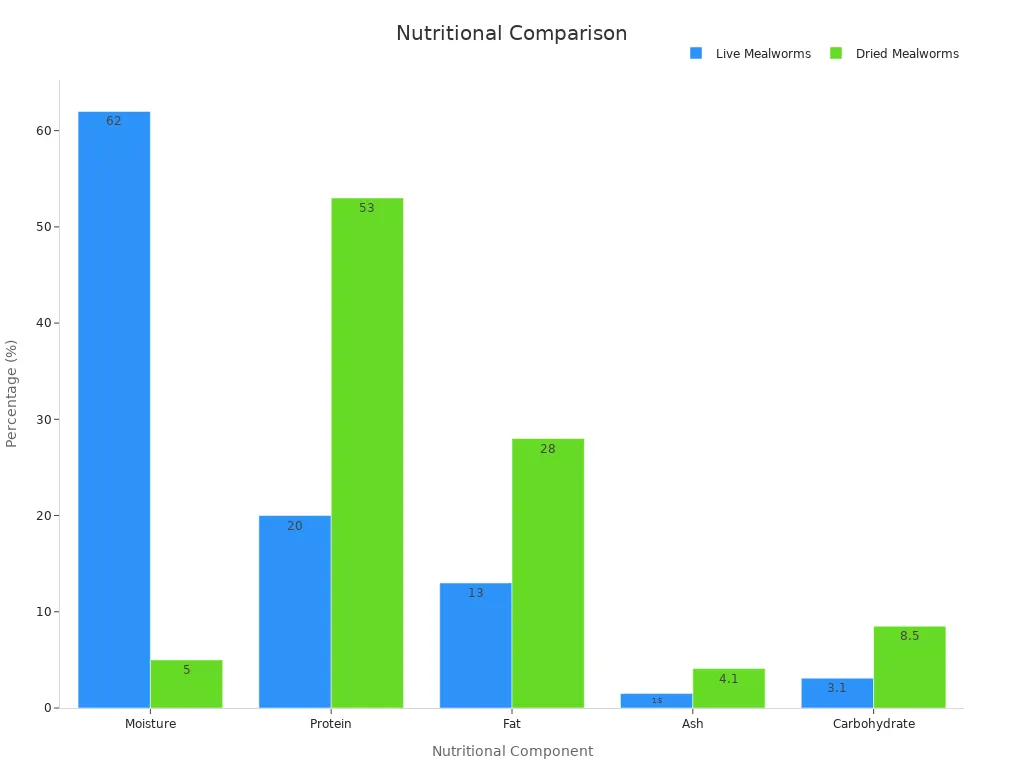
Dried mealworms work best for most parrot owners because they last longer and are less messy.
Tip: Always store dried mealworms in a cool, dry place to keep them fresh.
Balancing Mealworms with Other Foods
Parrots need a balanced diet. Mealworms for parrots should join a mix of seeds, pellets, fruits, and veggies. Both live and dried mealworms are safe when handled properly. Owners should watch for any signs of allergies, but most parrots enjoy mealworms without problems. Mixing mealworms with other foods keeps parrots healthy and happy.
Parrots thrive with a diet that includes mealworms. Studies show birds eating mealworms display more natural foraging, steady health, and improved gut bacteria.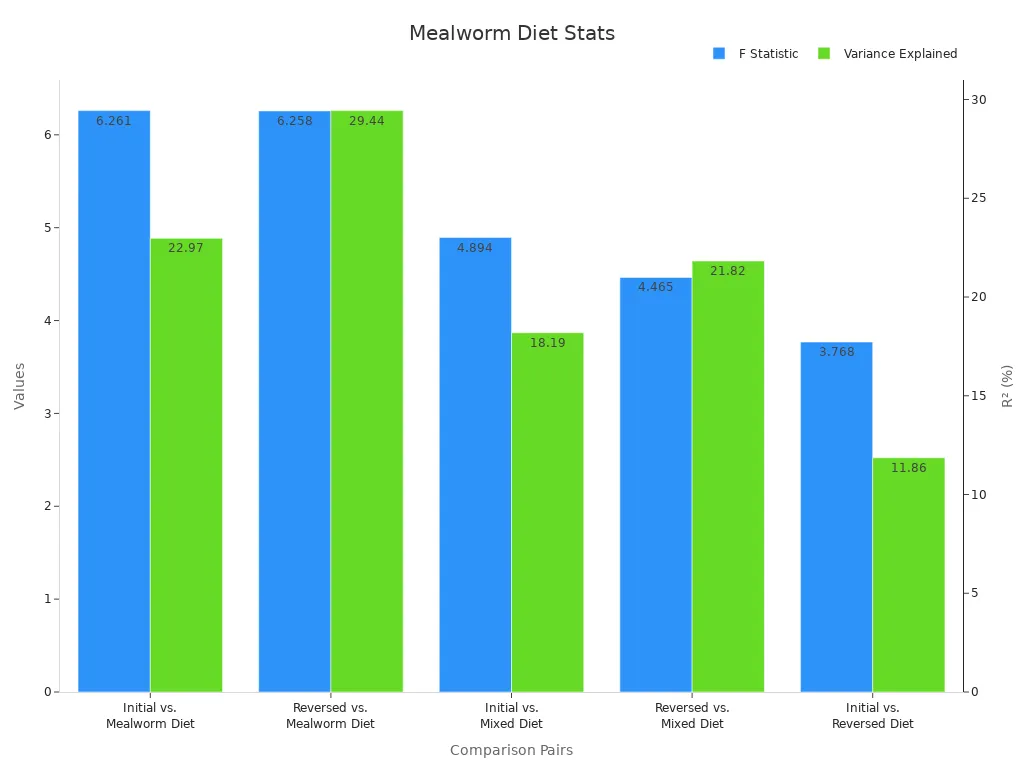
A balanced diet with mealworms brings variety, energy, and happiness to every parrot.
FAQ
Can parrots eat dried mealworms every day?
Parrots can enjoy dried mealworms a few times a week. Daily feeding is not needed. A balanced diet works best for their health.
Are Innosentia Dried Mealworms safe for all parrot species?
Yes, Innosentia Dried Mealworms are 100% natural. Parrots of all sizes can safely eat them as a treat.
How should owners store dried mealworms?
Store dried mealworms in a cool, dry place. Keep the bag sealed. This helps the mealworms stay fresh and tasty for a long time.


